SEMINARY HOSTS BOOKTALK SERIES
 BookTalks is a collaborative effort of Barbour Library and the Center for Writing and Learning Support featuring in-person and webinar conversations with PTS faculty and community members as well as other guests whose work is theological in nature. Our host not only highlights the books' subject matter, but also discusses the authors' writing processes, welcoming audience questions throughout. BookTalks are enhanced by library staff-curated subject guides and library displays for those interested in finding related resources. Recorded and linked to the PTS website and social media channels, BookTalks are envisioned to be creative resources that engage all who participate in theological and spiritual reflection and knowledge.
BookTalks is a collaborative effort of Barbour Library and the Center for Writing and Learning Support featuring in-person and webinar conversations with PTS faculty and community members as well as other guests whose work is theological in nature. Our host not only highlights the books' subject matter, but also discusses the authors' writing processes, welcoming audience questions throughout. BookTalks are enhanced by library staff-curated subject guides and library displays for those interested in finding related resources. Recorded and linked to the PTS website and social media channels, BookTalks are envisioned to be creative resources that engage all who participate in theological and spiritual reflection and knowledge.
Upcoming BookTalks
Appalling Bodies: Queer Figures Before and After Paul's Letters with Joseph A. Marchal
Dec. 4, 2025
5:00-6:00 p.m. ET
Online Webinar via Zoom

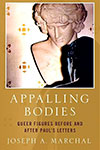 The letters of Paul are among the most commonly cited biblical texts in ongoing cultural and religious disputes about gender, sexuality, and embodiment. This book reframes these uses of the letters by reaching past Paul toward other, far more fascinating figures that appear before, after, and within the letters: androgynous females, castrated males, enslaved people, and barbaric foreigners. Each of these ancient figures deployed in these letters is situated within a specifically Roman imperial setting, an ambiance that cast them as complicated, debased, and dangerous. While the letters repeat and reinscribe the prevailing perspectives on this constellation of embodied figures, this project repositions them by implementing key insights from queer studies. In juxtaposing them against more recent figures of gender and sexual variation, also subject to vilification and marginalization, this project provides a series of alternative angles on these figures and the assemblies who spark and receive these letters, then or now.
The letters of Paul are among the most commonly cited biblical texts in ongoing cultural and religious disputes about gender, sexuality, and embodiment. This book reframes these uses of the letters by reaching past Paul toward other, far more fascinating figures that appear before, after, and within the letters: androgynous females, castrated males, enslaved people, and barbaric foreigners. Each of these ancient figures deployed in these letters is situated within a specifically Roman imperial setting, an ambiance that cast them as complicated, debased, and dangerous. While the letters repeat and reinscribe the prevailing perspectives on this constellation of embodied figures, this project repositions them by implementing key insights from queer studies. In juxtaposing them against more recent figures of gender and sexual variation, also subject to vilification and marginalization, this project provides a series of alternative angles on these figures and the assemblies who spark and receive these letters, then or now.
In staging a series of “touches across time,” Appalling Bodies (Oxford University Press, 2020) defamiliarizes and reorients what can be known about both the historical figures active in these ancient communities and those rhetorical figures that continue to be activated in contemporary settings. The aim is not to claim, anachronistically, that these figures are somehow identical to each other; rather, it is through anachronistic juxtaposition that the book highlights contingent connections—partial, particular, but shared practices of gender, sexuality, and embodiment that depart from prevailing perspectives and demonstrate a range of unexpected impacts for the interpretation of politically and religiously loaded literature.
Joseph Marchal is professor of religious studies and affiliated faculty in women’s and gender studies at Ball State University. They are the author, editor, or coeditor of 12 books. Solo-authored works include Appalling Bodies: Queer Figures Before and After Paul’s Letters (2020) and edited projects include Trans Biblical: New Approaches to Interpretation and Embodiment in Scripture (2025), After the Corinthian Women Prophets: Reimagining Rhetoric and Power (2021), and Bodies on the Verge: Queering Pauline Epistles (2019). Dr. Marchal also serves as a founding co-editor with Melissa W. Wilcox of the completely fee-free and open-access journal, QTR: A Journal of Trans and Queer Studies in Religion, and just completed their term as the founding chair of the Society of Biblical Literature’s first-ever Committee for LGBTIQ+ Scholars and Scholarship. Dr. Marchal’s current research projects circle around how “bad feelings” might get us a different sense of the people in the first century communities that sparked, received, recirculated, and repurposed the letters we now call “Paul’s” (how disgust, trauma, and loss/mourning might just be better cues into practices of solidarity in ancient assemblies, and maybe also now).
Please register in advance. Attendees will receive the Zoom webinar link for the event.
For more information visit our Libguide of curated resources for this event.
Past BookTalk Events
Through the Eyes of Titans: Finding Courage to Redeem the Soul of a Nation with Danjuma Gibson
Dr. Danjuma Gibson
Oct. 23, 2025
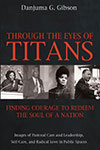
 Human beings tend to romanticize history or idealize historical figures. This is nowhere more apparent than the civil rights era of the 20th century. The problem is that when we idealize history, we fail to learn from it. The result is that history repeats itself along with its sins and atrocities. The January 6 Capitol insurrection and the current racial reckoning we are experiencing is unoriginal to the American experience. We have been here before.
Human beings tend to romanticize history or idealize historical figures. This is nowhere more apparent than the civil rights era of the 20th century. The problem is that when we idealize history, we fail to learn from it. The result is that history repeats itself along with its sins and atrocities. The January 6 Capitol insurrection and the current racial reckoning we are experiencing is unoriginal to the American experience. We have been here before.
Through the Eyes of Titans (Wipf & Stock, 2024) seeks to humanize people we have idealized. Readers are invited to challenge racial hatred and injustice in their own context by looking to the lives of historical figures who have faced the challenges we currently face. By examining the self-care practices of personalities like Ida B. Wells, Fannie Lou Hamer, Benjamin Elijah Mays, and Martin Luther King Jr., this book examines the practices of introspection and self-work these historical figures engaged in that enabled them to fulfill the body of work they are celebrated for today. By humanizing these historical titans, we can emulate similar practices of self-care and introspection in our own lives that can equip us in continuing the ongoing work of dismantling structures of racial hatred and oppression, and promoting freedom, love, equity, and justice to redeem the soul of a nation.
Dr. Danjuma Gibson is both a scholar and a licensed professional counselor with experience in theological education, congregational ministry, and administrative leadership. Before joining PTS, he served as professor of pastoral theology, care, and counseling at Calvin Theological Seminary, where he also designed, launched, and directed a new master of arts program in clinical mental health counseling. His research has particularly progressed the study of how Black and Brown communities respond to racial violence and economic factors such as gentrification and disinvestment. Dr. Gibson is also the author of Frederick Douglass, A Psychobiography: Rethinking Subjectivity in the Western Experiment of Democracy (Springer, 2018), and co-editor of Justice Matters: Spiritual Care and Pastoral Theological Imaginations in Times of the COVID-19 Pandemic (Routledge, 2023).
For more information visit our Libguide of curated resources for this event.
The Ethics of Immediacy: Dangerous Experience in Freud, Woolf, and Merleau-Ponty with Jeffrey McCurry
Jeffrey McCurry
May 1, 2025
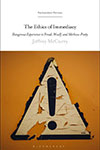
 In The Ethics of Immediacy (Bloomsbury, 2023), Dr. Jeffrey McCurry examines how Freud’s psychoanalytic theory, Woolf’s modernist criticism and fiction, and Merleau-Ponty’s phenomenology, psychology, literature, and philosophy in turns embraced the risks and dangers of putting immediate experience as the center of humanity, of respecting, understanding, appreciating, and following the lead of immediate, spontaneous, pre-reflective, pre-evaluative, concrete experience in human life. This book launches an ethical depth-charge to its reader: without any ideal, normative prescription, or even expectation, what responsibility, if any, does one have to interrogate immediate experience in one’s own life and times?
In The Ethics of Immediacy (Bloomsbury, 2023), Dr. Jeffrey McCurry examines how Freud’s psychoanalytic theory, Woolf’s modernist criticism and fiction, and Merleau-Ponty’s phenomenology, psychology, literature, and philosophy in turns embraced the risks and dangers of putting immediate experience as the center of humanity, of respecting, understanding, appreciating, and following the lead of immediate, spontaneous, pre-reflective, pre-evaluative, concrete experience in human life. This book launches an ethical depth-charge to its reader: without any ideal, normative prescription, or even expectation, what responsibility, if any, does one have to interrogate immediate experience in one’s own life and times?
Dr. Jeffrey McCurry is director of the Simon Silverman Phenomenology Center and affiliated faculty in the Department of Philosophy at Duquesne University. Educated at Johns Hopkins University, Duke University, and the Pittsburgh Psychoanalytic Center, his research centers on the intersection of philosophy, literature, and psychoanalysis, and he has published on Augustine, Freud, Merleau-Ponty, Lacan, and Derrida. He is also a member of faculty in the Pittsburgh Psychoanalytic Center.
Dr. McCurry was joined in conversation by Mark Russell, research and instruction librarian at Barbour Library, PTS.
For more information, visit our Libguide of curated resources for this event.
Jesus and His Promised Second Coming: Jewish Eschatology and Christian Origins with Tucker Ferda
Dr. Tucker Ferda
March 20, 2025
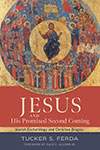
 In this pioneering study of Scripture and reception history, Tucker S. Ferda shows that the hope for Jesus’s second coming originated in his own message about the coming of the kingdom after a time of distress.
In this pioneering study of Scripture and reception history, Tucker S. Ferda shows that the hope for Jesus’s second coming originated in his own message about the coming of the kingdom after a time of distress.
Most historical Jesus scholars take for granted that Jesus’s second coming was invented by his zealous early followers. In Jesus and His Promised Second Coming, Dr. Ferda challenges this critical consensus. Using innovative methodology, Dr. Ferda works backward through reception history to Paul and the Gospels to argue that the hope for the second coming originated in Jesus’s own grappling with the prospect of death and his conviction that the kingdom was near; he expected a return that would coincide with the final judgment and the end of the age within the space of a generation.
Bold and historically astute, Jesus and His Promised Second Coming (Eerdmanns, 2024) breathes new life into a long-stagnant conversation. It also offers readers fresh insight into the history of Jewish-Christian relations. Students and scholars of the New Testament will need to read and engage with Ferda’s provocative argument.
Dr. Tucker Samson Ferda is associate professor of New Testament. He earned his Ph.D. from the University of Pittsburgh, where he also served as teaching fellow. Dr. Ferda has expertise in a wide range of areas in biblical studies, including the Gospels, the life of Jesus, the Old Testament in the New, the history of biblical interpretation, Hellenistic Jewish literature, the Dead Sea Scrolls, and the theological interpretation of Scripture.
For more information, visit our Libguide of curated resources for this event.
Season's Greetings: Christmas Letters from Those Who Were There with Ruth L. Boling '24
Dr. Ruth Boling '24
Dec. 5, 2024
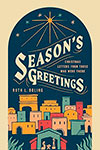
 Rediscover the beloved Christmas story through the words of those who were there. From King Herod to the Magi, the Innkeeper, the midwife -- and even Jesus himself -- hear the dramatic stories of the Bible characters forever changed by the miracle that took place in Bethlehem so long ago.
Rediscover the beloved Christmas story through the words of those who were there. From King Herod to the Magi, the Innkeeper, the midwife -- and even Jesus himself -- hear the dramatic stories of the Bible characters forever changed by the miracle that took place in Bethlehem so long ago.
In the Advent devotional Season's Greetings, meet 12 biblical characters -- some well-known, others less so -- who share what Christmas meant to them through personal letters written to 21st-century readers. As we hear the multiple perspectives of what Jesus' birth and life meant for these characters of old, we're invited to ask what it means for us, now, today. Each chapter ends with a prayer, reflection questions, and journaling prompts, making this new resource an enriching Advent companion for individuals, small groups, and church leaders alike.
Ruth L. Boling is a 2024 graduate of Pittsburgh Theological Seminary in the Doctor of Ministry program in Creative Writing and Public Theology. She is a writer and Presbyterian minister who has served churches in Ohio, New Hampshire, New York, and New Jersey for more than three decades. She is the co-author of the bestselling A Children's Guide to Worship and author of Come Worship with Me: A Journey through the Church Year. Season’s Greetings began as a labor of love for her congregation in Bloomfield, N.J., and grew into a book during her DMin program.
For more information, visit our Libguide of curated resources for this event.
The First Christian Letters: Reading 1 and 2 Thessalonians with Rafael Rodriguez
Dr. Rafael Rodriguez
Oct. 24, 2024
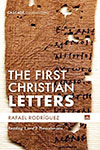
 Paul's letters to the Thessalonians are the earliest surviving Christian documents. They are also among the most easily overlooked parts of the New Testament. What could these short, simple letters possibly have to say to a world caught in the throes of racial discord, political polarization, fears of an uncertain future, and fights over truth and false news? While Paul and his companions could not have imagined anything like the 21st century, their letters in the mid-first century to non-Jewish followers of Jesus in Northern Greece address problems we still wrestle with today: race and ethnicity, family, ethics, an unknown future, how to respond to strangers, and more. These letters, rather than being an outdated part of Paul's collected letters, provoke us to throw ourselves into the great challenges of the modern world, to resist the temptation to repay "another person evil for evil," and to "pursue the good, both for one another and for everyone" (1 Thess 5:15). Will we read these ancient letters anew?
Paul's letters to the Thessalonians are the earliest surviving Christian documents. They are also among the most easily overlooked parts of the New Testament. What could these short, simple letters possibly have to say to a world caught in the throes of racial discord, political polarization, fears of an uncertain future, and fights over truth and false news? While Paul and his companions could not have imagined anything like the 21st century, their letters in the mid-first century to non-Jewish followers of Jesus in Northern Greece address problems we still wrestle with today: race and ethnicity, family, ethics, an unknown future, how to respond to strangers, and more. These letters, rather than being an outdated part of Paul's collected letters, provoke us to throw ourselves into the great challenges of the modern world, to resist the temptation to repay "another person evil for evil," and to "pursue the good, both for one another and for everyone" (1 Thess 5:15). Will we read these ancient letters anew?
Dr. Rafael Rodríguez is professor of New Testament at PTS and has taught for nearly 20 years. He serves on The Catholic Biblical Quarterly editorial board, the Life, Letters, and Legacy of Paul (SCJ) steering committee, and the Journal for the Study of the Historical Jesus editorial board. Dr. Rodríguez’s areas of expertise include the Apostle Paul, the Epistle to the Romans, the Epistles to the Thessalonians, Paul within Judaism, and Second Temple Judaism and Christian origins. He also specializes in social memory approaches to the Bible. In addition to The First Christian Letters: Reading 1 and 2 Thessalonians, he is the author of several books and articles.
For more information, visit our Libguide of curated resources for this event.
A Wild and Sacred Call: Nature-Psyche-Spirit with Will Adams
A Wild and Sacred Call: Nature-Psyche-Spirit
Dr. Will Adams
May 2, 2024
 Our current ecological derangement is not only a biological crisis but more deeply a crisis of consciousness, cult
Our current ecological derangement is not only a biological crisis but more deeply a crisis of consciousness, cult ure, and relationship. The core ethical responsibility of our contemporary era, therefore, and the aspiration of this ecopsychological/ecospiritual book, is to create a mutually enhancing relationship between humankind and the rest of nature. To address the urgent concerns of global warming, mass extinction, toxic environments, and our loss of conscious contact with the natural world, psychologist Dr. Will W. Adams weaves together insights from Zen Buddhism, Christian mysticism, phenomenology, psychoanalysis, and the practice of psychotherapy. Through a transpersonal, nondual, contemplative approach, Adams explores the fundamental malady of supposed separation (or dissociation): mind over body, self over others, my tribe over others', humans over the rest of nature. Instead of merely discussing these crucial issues in abstract terms, the book presents healing alternatives through storytelling, poetry, and theoretical inquiry. Written in an engaging, down-to-earth manner grounded in vivid descriptions of actual lived experience, A Wild and Sacred Call (SUNY Press, 2023) speaks across disciplines to students, experts, and nonspecialists alike.
ure, and relationship. The core ethical responsibility of our contemporary era, therefore, and the aspiration of this ecopsychological/ecospiritual book, is to create a mutually enhancing relationship between humankind and the rest of nature. To address the urgent concerns of global warming, mass extinction, toxic environments, and our loss of conscious contact with the natural world, psychologist Dr. Will W. Adams weaves together insights from Zen Buddhism, Christian mysticism, phenomenology, psychoanalysis, and the practice of psychotherapy. Through a transpersonal, nondual, contemplative approach, Adams explores the fundamental malady of supposed separation (or dissociation): mind over body, self over others, my tribe over others', humans over the rest of nature. Instead of merely discussing these crucial issues in abstract terms, the book presents healing alternatives through storytelling, poetry, and theoretical inquiry. Written in an engaging, down-to-earth manner grounded in vivid descriptions of actual lived experience, A Wild and Sacred Call (SUNY Press, 2023) speaks across disciplines to students, experts, and nonspecialists alike.
Dr. Adams was joined in conversation by the Rev. Dr. L. Roger Owens, Hugh Thomson Kerr Professor of Pastoral Theology at Pittsburgh Seminary.
For more information, visit our Libguide of curated resources for this event.
Author Bio
Dr. Adams is associate professor of psychology at Duquesne University, and a psychotherapist and ecopsychologist in private practice. Dr. Adams' scholarship has appeared in The Humanistic Psychologist, Journal of Humanistic Psychology, Journal of Transpersonal Psychology, ReVision, Journal of Phenomenological Psychology, Existential Analysis, and Psychoanalysis and Contemporary Thought. Dr. Adams' special interests include ecopsychology, contemplative spirituality, and psychotherapy.
Have You Got Good Religion? Black Women's Faith, Courage, and Moral Leadership in the Civil Rights Movement with AnneMarie Mingo
The Rev. Dr. AnneMarie Mingo
April 11, 2024

 What compels a person to risk her life to change deeply rooted systems of injustice in ways that may not benefit her? The thousands of Black churchwomen who took part in civil rights protests drew on faith, courage, and moral imagination to acquire the lived experiences at the heart of the answers to that question. In Have You Got Good Religion? Black Women's Faith, Courage, and Moral Leadership in the Civil Rights Movement (University of Illinois, 2024) Dr. AnneMarie Mingo brings these forgotten witnesses into the historical narrative to explore the moral and ethical world of a generation of Black Churchwomen and the extraordinary liberation theology they created. These women acted out of belief that what they did was bigger than themselves. Taking as their goal nothing less than the moral transformation of American society, they joined the movement because it was something they had to do. Their personal accounts of a lived religion enacted in the world provide powerful insights into how faith steels human beings to face threats, jail, violence, and seemingly implacable hatred. Throughout, Dr. Mingo draws on their experiences to construct an ethical model meant to guide contemporary activists in the ongoing pursuit of justice. A depiction of moral imagination that resonates today, Have You Got Good Religion? reveals how Black churchwomen’s understanding of God became action and transformed a nation.
What compels a person to risk her life to change deeply rooted systems of injustice in ways that may not benefit her? The thousands of Black churchwomen who took part in civil rights protests drew on faith, courage, and moral imagination to acquire the lived experiences at the heart of the answers to that question. In Have You Got Good Religion? Black Women's Faith, Courage, and Moral Leadership in the Civil Rights Movement (University of Illinois, 2024) Dr. AnneMarie Mingo brings these forgotten witnesses into the historical narrative to explore the moral and ethical world of a generation of Black Churchwomen and the extraordinary liberation theology they created. These women acted out of belief that what they did was bigger than themselves. Taking as their goal nothing less than the moral transformation of American society, they joined the movement because it was something they had to do. Their personal accounts of a lived religion enacted in the world provide powerful insights into how faith steels human beings to face threats, jail, violence, and seemingly implacable hatred. Throughout, Dr. Mingo draws on their experiences to construct an ethical model meant to guide contemporary activists in the ongoing pursuit of justice. A depiction of moral imagination that resonates today, Have You Got Good Religion? reveals how Black churchwomen’s understanding of God became action and transformed a nation.
Author Bio
The Rev. Dr. AnneMarie Mingo is associate professor of ethics, culture, and moral leadership, and director of the Metro-Urban Institute at Pittsburgh Theological Seminary, positions she has held since 2022. She is also an ordained itinerant elder in the African Methodist Episcopal Church.
For more information, visit our Libguide of curated resources for this event.
Claiming the Call to Preach: Four Female Pioneers of Preaching in Nineteenth-Century America
The Rev. Dr. Donna Giver-Johnston
Dec. 7, 2023

 Claiming the Call to Preach (Oxford University Press, 2021) traces the history of call through the 19th century, at a time when the question of women’s call to preach, although seemingly fixed by ecclesial authority and cultural convention, was being raised by courageous women in different settings, through different genres, and to different effect. This book recovers the neglected narrative of women’s call to preach through the historical accounts and rhetorical witness of four groundbreaking women preachers: Jarena Lee, Frances Willard, Louisa Woosley, and Florence Spearing Randolph. Scholarship has been written on women who have preached in history, but not on how they managed to claim their call to preach despite the restrictions of gender inequality. In response, these women received endorsement of their claims to pulpit places, engaged in sacred persuasive speech, and preached as ministers of the sacred office. Through feminist hermeneutics, this book examines call narratives which used rhetorical strategies to articulate effective arguments for women’s call to the preaching ministry of the church.
Claiming the Call to Preach (Oxford University Press, 2021) traces the history of call through the 19th century, at a time when the question of women’s call to preach, although seemingly fixed by ecclesial authority and cultural convention, was being raised by courageous women in different settings, through different genres, and to different effect. This book recovers the neglected narrative of women’s call to preach through the historical accounts and rhetorical witness of four groundbreaking women preachers: Jarena Lee, Frances Willard, Louisa Woosley, and Florence Spearing Randolph. Scholarship has been written on women who have preached in history, but not on how they managed to claim their call to preach despite the restrictions of gender inequality. In response, these women received endorsement of their claims to pulpit places, engaged in sacred persuasive speech, and preached as ministers of the sacred office. Through feminist hermeneutics, this book examines call narratives which used rhetorical strategies to articulate effective arguments for women’s call to the preaching ministry of the church.
Dr. Giver-Johnston was joined in conversation by the Rev. Dr. Leanna K. Fuller, Joan Marshall Associate Professor of Pastoral Care at PTS.
For more information visit our Libguide of curated resources for this event.
Author Bio
The Rev. Dr. Donna Giver-Johnston is director of the Doctor of Ministry Program at Pittsburgh Theological Seminary. She is an ordained Minister of Word and Sacrament in the Presbyterian Church (U.S.A.) with more than 20 years of experience in pastoral ministry.
Resurrecting Church: Where Justice and Diversity Meet Radical Welcome and Healing Hope with John Cleghorn
The Rev. Dr. John Cleghorn '17
Nov. 9, 2023


In Resurrecting Church (Fortress Press, 2021) author John Cleghorn raises these important questions: Can churches survive, even be resurrected, at the intersections of race, sexuality, class, and faith background? Can congregations be liberated by rebuilding around those on the margins who have been wounded by church? As more U.S. cities become majority-minority, the "mainline" church remains stubbornly white and homogeneous. Church leaders and thinkers are seeking ways to build more racial diversity and radical welcome. This book provides hope and practical examples of how this can happen.
Cleghorn declares, "God is doing what Jeremiah calls 'a new thing'" in congregations where multiple types of diversity intersect, erecting spiritual hospitals for the wounded and marginalized. For the church, these intersections provide both a current lens of self-examination and avenues to growth in faith. With stories, people profiles, and insights from their leaders and members, this book breaks new ground with practical learning and lessons drawn from original research and the lived experience of intersectional churches across the U.S.
Author Bio
John Cleghorn is pastor of Caldwell Presbyterian Church in the Elizabeth neighborhood of Charlotte, N.C., where he has served since 2008. Caldwell is a diverse, progressive, missional congregation that has enjoyed a strong resurgence in recent years. Cleghorn is a 2017 graduate of the doctor of ministry degree program at Pittsburgh Theological Seminary.
Letters from the Ecotone: Ecology, Theology, and Climate Change with Andrew Nagy-Benson and Andrea Lloyd
Andrew Nagy-Benson and Andrea Lloyd
April 14, 2023


 Letters from the Ecotone (Wipf and Stock, 2022) invites readers into an open-hearted dialogue between friends—a scientist and a pastor. In a series of letters written during the pandemic, Lloyd and Nagy-Benson explore the realities of climate change from the perspectives of ecology and Christian theology. The authors seek common ground, where science and religion meet, and share a vision of flourishing life on earth. At a time when the climate crisis is quickly emerging as an existential threat, this book charts a journey imbued with the insights of ecological science and the wisdom of the Christian tradition.
Letters from the Ecotone (Wipf and Stock, 2022) invites readers into an open-hearted dialogue between friends—a scientist and a pastor. In a series of letters written during the pandemic, Lloyd and Nagy-Benson explore the realities of climate change from the perspectives of ecology and Christian theology. The authors seek common ground, where science and religion meet, and share a vision of flourishing life on earth. At a time when the climate crisis is quickly emerging as an existential threat, this book charts a journey imbued with the insights of ecological science and the wisdom of the Christian tradition.
Author Bios
Andrew Nagy-Benson is the senior pastor of The Congregational Church of Middlebury (United Church of Christ) and an affiliate chaplain at Middlebury College. He is currently a student in the Doctor of Ministry program in Creative Writing and Public Theology at Pittsburgh Theological Seminary. Andy lives with his family in Weybridge, Vermont. Andrea Lloyd is the pastor of the Trinitarian Congregational Parish of Castine (United Church of Christ) and a former professor of biology at Middlebury College. Andi lives in Castine, Maine.
Loving What Doesn't Last: An Adoration of the Body with Christina Kukuk '05
The Rev. Christina Kukuk '05
Feb. 24, 2023

 Loving What Doesn’t Last: An Adoration of the Body (Morehouse Publishing, 2021) is a book for all who inhabit a body and wonder about its place in the universe. Through lyric essays and poetry, the Rev. Christina Kukuk '05 finds the spiritual in the most material bodily experiences: a 21-year-old victim of the opioid crisis, the mother who plants an orchard in his memory, a girl’s tumble through food scarcity, an adolescent awakening to infatuation at summer camp, and a woman waiting hours for her lover’s recovery on a hospital’s transplant floor. Earthy and divine, funny at times, Loving What Doesn’t Last invites readers into an adoration of the body—birth, food, love, pain, death, and water become skin-wrapped windows into the holy.
Loving What Doesn’t Last: An Adoration of the Body (Morehouse Publishing, 2021) is a book for all who inhabit a body and wonder about its place in the universe. Through lyric essays and poetry, the Rev. Christina Kukuk '05 finds the spiritual in the most material bodily experiences: a 21-year-old victim of the opioid crisis, the mother who plants an orchard in his memory, a girl’s tumble through food scarcity, an adolescent awakening to infatuation at summer camp, and a woman waiting hours for her lover’s recovery on a hospital’s transplant floor. Earthy and divine, funny at times, Loving What Doesn’t Last invites readers into an adoration of the body—birth, food, love, pain, death, and water become skin-wrapped windows into the holy.
Author Bio
Kukuk is a graduate of Pittsburgh Seminary and has been an ordained pastor in the United Church of Christ for more than 17 years, serving congregations in Cleveland and rural Southern Oregon, amongst other places. A writer and pastor currently living in Oregon, Kukuk attended journalism school at Kent State University and worked as a business reporter for the Akron Beacon Journal in Ohio. Since then, her freelance work has appeared in numerous publications, including Belt Magazine, Bearings Online, GEEZ Magazine, The Christian Century, and Spirituality & Health.
Necessary Risks: Challenges Privileged People Need to Face with the Rev. Dr. Teri McDowell Ott
The Rev. Dr. Teri McDowell Ott
Dec, 9, 2022

 Moderator Dr. Shan Overton, director of the PTS Writing Center, and co-host the Rev. Karen Rohrer, PTS's director of the Center for Adaptive and Innovative Ministry, were in conversation with pastor, author, and editor/publisher the Rev. Dr. Teri McDowell Ott about her new book Necessary Risks: Challenges Privileged People Need to Face (Fortress Press, 2022).
Moderator Dr. Shan Overton, director of the PTS Writing Center, and co-host the Rev. Karen Rohrer, PTS's director of the Center for Adaptive and Innovative Ministry, were in conversation with pastor, author, and editor/publisher the Rev. Dr. Teri McDowell Ott about her new book Necessary Risks: Challenges Privileged People Need to Face (Fortress Press, 2022).
Necessary Risks is a book for people of privilege who are increasingly aware of racial injustice but unsure of what to do about it and afraid to venture into challenging dialogues and spaces. Ott encourages readers to value risk-taking as the path toward a more equitable and just world. She builds on memoir-like stories to explore 10 risks with which she has wrestled in her work with diverse populations as the chaplain of a liberal arts college and as a volunteer in a men's state prison. These necessary risks are also informed by Ott's study of authors, theologians, and scholars of color, such as Martin Luther King Jr., James Baldwin, bell hooks, Audre Lorde, Gloria Anzaldúa, Ada María Isasi-Díaz, and Eddie Glaude Jr. Demonstrating that in the face of injustice, white silence and inaction are not neutral, Necessary Risks leads readers to feel less fearful and more capable in diverse settings and ultimately to contribute to personal and communal learning and growth, change and transformation.​
Author Bio
The Rev. Dr. Teri McDowell Ott has been an ordained Presbyterian (PCUSA) minister for more than 20 years. After receiving her master of divinity degree from Louisville Presbyterian Theological Seminary she served the church in a variety of pastoral positions. In 2008 she completed her doctor of ministry degree from McCormick Theological Seminary. She began serving Monmouth College as Chaplain in 2011 and was promoted to dean of the chapel in 2019. In 2021, Ott accepted a new call as editor / publisher of The Presbyterian Outlook, the only independent publisher of the Presbyterian Church (U.S.A.).
Revisiting Rahab: Another Look at the Woman of Jericho with Dr. Kimberly D. Russaw
Dr. Kimberly D. Russaw
Nov. 11, 2022
 Revisiting Rahab: Another Look at the Woman of Jericho (Wesley Foundry Books, 2021) focuses on a woman who is remembered primarily as the prostitute who helped the Israelites claim the land of promise. Relegated to the crevices of the story and the reader's imagination and branded as a sex-worker and foreigner, Rahab nevertheless defies the authority of the Jericho king and negotiates with representatives of the Israelite army, thereby saving her family and more. According to the book’s author, newly appointed PTS professor Dr. Kimberly Russaw, Rahab is not a one-dimensional character; instead, she is a complex woman who upends the patriarchal ecosystem. By reframing Rahab, Dr. Russaw offers the biblical character as an exemplar of the inconvenient characters who persist at the margins even today. Dr. Russaw argues that the writers of Judges make the point that God is a promise keeper even to those beyond the Israelite camp.
Revisiting Rahab: Another Look at the Woman of Jericho (Wesley Foundry Books, 2021) focuses on a woman who is remembered primarily as the prostitute who helped the Israelites claim the land of promise. Relegated to the crevices of the story and the reader's imagination and branded as a sex-worker and foreigner, Rahab nevertheless defies the authority of the Jericho king and negotiates with representatives of the Israelite army, thereby saving her family and more. According to the book’s author, newly appointed PTS professor Dr. Kimberly Russaw, Rahab is not a one-dimensional character; instead, she is a complex woman who upends the patriarchal ecosystem. By reframing Rahab, Dr. Russaw offers the biblical character as an exemplar of the inconvenient characters who persist at the margins even today. Dr. Russaw argues that the writers of Judges make the point that God is a promise keeper even to those beyond the Israelite camp.
Author Bio
.jpg) Dr. Kimberly D. Russaw was appointed associate professor of Old Testament at PTS in 2022. She is a member of the Society of Biblical Literature, serving as the chair of the African American Biblical Hermeneutics program unit. She is also an editorial board member of the Journal of Biblical Literature and is a member the American Academy of Religion, the Society for the Study of Black Religion, and the National Black MBA Association. Her publications include Daughters in the Hebrew Bible (Lexington Books, 2018) and “Undaunted: Reading Miriam for the Sisters They Tried to Erase” in Stony the Road We Trod: African American Biblical Interpretation 30th Anniversary Expanded Edition (Fortress Press, 2021). Dr. Russaw has lectured or presented at events for PBS, Bible and Religions of the Ancient Near East, The Association of Theological Schools, and the Society of Biblical Literature, in addition to events at universities and seminaries. She received her Ph.D. in Hebrew Bible and Ancient Israel from Vanderbilt University. Dr. Russaw is an ordained itinerant elder in the African Methodist Episcopal Church.
Dr. Kimberly D. Russaw was appointed associate professor of Old Testament at PTS in 2022. She is a member of the Society of Biblical Literature, serving as the chair of the African American Biblical Hermeneutics program unit. She is also an editorial board member of the Journal of Biblical Literature and is a member the American Academy of Religion, the Society for the Study of Black Religion, and the National Black MBA Association. Her publications include Daughters in the Hebrew Bible (Lexington Books, 2018) and “Undaunted: Reading Miriam for the Sisters They Tried to Erase” in Stony the Road We Trod: African American Biblical Interpretation 30th Anniversary Expanded Edition (Fortress Press, 2021). Dr. Russaw has lectured or presented at events for PBS, Bible and Religions of the Ancient Near East, The Association of Theological Schools, and the Society of Biblical Literature, in addition to events at universities and seminaries. She received her Ph.D. in Hebrew Bible and Ancient Israel from Vanderbilt University. Dr. Russaw is an ordained itinerant elder in the African Methodist Episcopal Church.
Check out more library and online resources related to this BookTalk.
Binding the Ghost: Theology, Mystery, and the Transcendence of Literature with Dr. Ed Simon
Dr. Ed Simon
Oct. 14, 2022

 Binding the Ghost (Fortress Press, 2022) is both manifesto and example of a new variety of reading that centers a theological perspective in considering what literature actually does. Neither dogmatic nor apologetic, sectarian or denominational, this mode of reading acknowledges the inherently charged strangeness of writing and fiction, whereby authors have the ability to seemingly create entire universes from words alone.
Binding the Ghost (Fortress Press, 2022) is both manifesto and example of a new variety of reading that centers a theological perspective in considering what literature actually does. Neither dogmatic nor apologetic, sectarian or denominational, this mode of reading acknowledges the inherently charged strangeness of writing and fiction, whereby authors have the ability to seemingly create entire universes from words alone.
Dr. Ed Simon considers the theological depth, resonance, and mystery of the acts of reading and writing. His lyrical, incisive essays cover subjects such as the incarnational poetics of reading a physical book as opposed to reading online, the historical relationship between monotheism and the development of the alphabet, how the novel and Protestantism developed interiority within people, the occult significance of punctuation, and the functional similarities between poetry and prayer. Binding the Ghost presents a humane sacralization of reading and writing that takes into account the wonder, enchantment, and mystery of the very idea of poetry and fiction.
Author Bio
Dr. Simon holds a Ph.D. in English from Lehigh University. He is a staff writer for The Millions, and his work has appeared in The Atlantic, The Paris Review Daily, McSweeney's Internet Tendency, Poetry, The Washington Post, The Rumpus, Salon, Lit Hub, The Los Angeles Review of Books, Religion Dispatches, Newsweek, Killing the Buddha, The Revealer, The Public Domain Review, JSTOR Daily, Tablet, History News Network, Atlas Obscura, Aeon, The New Republic, and The New York Times, among several others. He is also the author of several books, including America and Other Fictions: On Radical Faith and Post-Religion; Furnace of This World, or, 36 Observations about Goodness; and Printed in Utopia: The Renaissance's Radicalism, and is the co-editor of The God Beat: What Journalism Says about Faith and Why It Matters. He is the new editor in chief of Belt Magazine and will be teaching in the PTS Doctor of Ministry in Creative Writing and Public Theology program in fall 2023.
Check out more library and online resources related to this BookTalk.
Everyday Contemplative: The Way of Prayerful Living with Dr. Roger Owens
Dr. Roger Owens
Sept. 16, 2022

 During the Fall 2022 Launch of BookTalks, we celebrated faculty member the Rev. Dr. L. Roger Owens' most recent book, Everyday Contemplative: The Way of Prayerful Living (Upper Room Books, 2022). In Everyday Contemplative, Dr. Owens asks a central question: What does it mean to live a contemplative life? He then explores various dimensions of this kind of living for the remainder of the book. Our time together included a robust conversation about how Dr. Owens, professor of Christian spirituality and ministry at PTS and an ordained elder in The United Methodist Church, came to write this particular book during the pandemic. Along the way, we learned from him about the seven aspects of ordinary contemplative life that he describes in the book.
During the Fall 2022 Launch of BookTalks, we celebrated faculty member the Rev. Dr. L. Roger Owens' most recent book, Everyday Contemplative: The Way of Prayerful Living (Upper Room Books, 2022). In Everyday Contemplative, Dr. Owens asks a central question: What does it mean to live a contemplative life? He then explores various dimensions of this kind of living for the remainder of the book. Our time together included a robust conversation about how Dr. Owens, professor of Christian spirituality and ministry at PTS and an ordained elder in The United Methodist Church, came to write this particular book during the pandemic. Along the way, we learned from him about the seven aspects of ordinary contemplative life that he describes in the book.
How Not To Be Afraid: Seven Ways to Live When Everything Seems Terrifying with Gareth Higgins
Dr. Gareth Higgins
June 23, 2022

 In an epigraph at the beginning of his new book, How Not To Be Afraid: Seven Ways to Live When Everything Seems Terrifying (Broadleaf Books, 2021), Gareth Higgins quotes Rosa Parks, who said, "I have learned over the years that when one's mind is made up, this diminishes fear; knowing what must be done does away with fear." Given the overlapping crises of our current context, when fear and anxiety are at a high water mark, Parks's wisdom provides a helpful launching point for Higgins's project to transform his own fear and to help others transform theirs as well.
In an epigraph at the beginning of his new book, How Not To Be Afraid: Seven Ways to Live When Everything Seems Terrifying (Broadleaf Books, 2021), Gareth Higgins quotes Rosa Parks, who said, "I have learned over the years that when one's mind is made up, this diminishes fear; knowing what must be done does away with fear." Given the overlapping crises of our current context, when fear and anxiety are at a high water mark, Parks's wisdom provides a helpful launching point for Higgins's project to transform his own fear and to help others transform theirs as well.
Author Bio
Gareth Higgins was born in Belfast during the Troubles in Northern Ireland. He holds a Ph.D. in sociology and lectures widely about storytelling, violence reduction, the power of dreams, and connection with the earth. A frequent collaborator with Kathleen Norris and Brian McLaren, Higgins led a peacebuilding community in Northern Ireland and is a co-founder of the Wild Goose Festival, the New Story Festival, and the Movies & Meaning Festival. He is the editor of The Porch Magazine and is currently teaching in the Doctor of Ministry Program in Creative Writing and Public Theology at Pittsburgh Theological Seminary.
A Practical Vision for Congregational Mission with Hunter Farrell and Bala Khyllep
The Rev. Dr. B. Hunter Farrell and the Rev. S. Balajiedlang Khyllep, World Mission Initiative, PTS
May 13, 2022
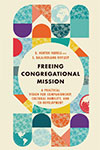
 Leaders of the Seminary's World Mission Initiative, B. Hunter Farrell and S. Balajiedlang Khyllep, discussed their new book Freeing Congregational Mission: A Practical Vision for Companionship, Cultural Humility, and Co-development (IVP Academic, 2022). Written in response to the deepening crisis in mission as practiced by North American congregations, Farrell and Khyllep critique the current consumer-oriented, colonial-minded approach to congregational mission, and they propose ways that church leaders can ground more faithful and effective missions through Christ-centered companionship, cultural humility, and co-development. Pastor David Shields writes in a review that "This book is prophetic. It ruthlessly confronts our current cultural baggage around missions all the while calling us back to Jesus and showing better ways to engage." Our conversation, which included audience in a Q&A, engaged Farrell and Khyllep's prophetic call for congregations to direct their resources in life-giving ways as they seek the mission of God.
Leaders of the Seminary's World Mission Initiative, B. Hunter Farrell and S. Balajiedlang Khyllep, discussed their new book Freeing Congregational Mission: A Practical Vision for Companionship, Cultural Humility, and Co-development (IVP Academic, 2022). Written in response to the deepening crisis in mission as practiced by North American congregations, Farrell and Khyllep critique the current consumer-oriented, colonial-minded approach to congregational mission, and they propose ways that church leaders can ground more faithful and effective missions through Christ-centered companionship, cultural humility, and co-development. Pastor David Shields writes in a review that "This book is prophetic. It ruthlessly confronts our current cultural baggage around missions all the while calling us back to Jesus and showing better ways to engage." Our conversation, which included audience in a Q&A, engaged Farrell and Khyllep's prophetic call for congregations to direct their resources in life-giving ways as they seek the mission of God.
Witches and Mystics in Reformation Scotland with Nancy Hayes Kilgore
The Rev. Dr. Nancy Hayes Kilgore '83
April 20, 2022
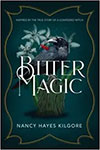 PTS alumna Nancy Hayes Kilgore, an ordained minister, psychotherapist, writing coach, and novelist, discussed her most recent novel, Bitter Magic​ (Milford House, 2021), which is inspired by the true story of the witchcraft trial of Isobel Gowdie, a woman caught up in the height of the witch craze in 17th century Scotland. This BookTalk included a presentation by the author, a reading from the book, and an interview with the author.
PTS alumna Nancy Hayes Kilgore, an ordained minister, psychotherapist, writing coach, and novelist, discussed her most recent novel, Bitter Magic​ (Milford House, 2021), which is inspired by the true story of the witchcraft trial of Isobel Gowdie, a woman caught up in the height of the witch craze in 17th century Scotland. This BookTalk included a presentation by the author, a reading from the book, and an interview with the author.
Mary Lou Williams: Music for the Soul with Deanna Witkowski
Deanna Witkowski, Author, Jazz Pianist, and Composer
March 18, 2022
 During this BookTalk event, pianist, composer, and biographer Deanna Witkowski discusses her new book, Mary Lou Williams: Music for the Soul, which offers a fresh and welcome perspective on the life and music of the legendary jazz pianist, composer, and liturgist, Mary Lou Williams (1910-1981). Witkowski also recently released a Williams tribute recording, entitled Force of Nature, on MCG Jazz, the Manchester Craftsmen's Guild label. In telling Williams' fascinating life story in the biography, Witkowski illumines Williams' mantra that "jazz is healing to the soul." This conversation focuses on the ways that Williams' life and faith intertwined in and through her music.
During this BookTalk event, pianist, composer, and biographer Deanna Witkowski discusses her new book, Mary Lou Williams: Music for the Soul, which offers a fresh and welcome perspective on the life and music of the legendary jazz pianist, composer, and liturgist, Mary Lou Williams (1910-1981). Witkowski also recently released a Williams tribute recording, entitled Force of Nature, on MCG Jazz, the Manchester Craftsmen's Guild label. In telling Williams' fascinating life story in the biography, Witkowski illumines Williams' mantra that "jazz is healing to the soul." This conversation focuses on the ways that Williams' life and faith intertwined in and through her music.
Out with the Old, In with the New: Negotiating Identity, Race, and Place with Jennifer Kaalund
Dr. Jennifer Kaalund, Associate Professor of New Testament, PTS
Feb. 11, 2022
%23.jpg) In the February 2022 BookTALK, Dr. Jennifer Kaalund, associate professor of New Testament at PTS, discussed the African American Great Migration in the early 20th century and the formation of the New Negro, an identity that was associated with the Harlem Renaissance but also part of a larger cultural moment. In addition, Dr. Kaalund placed what we learn from this historical moment into conversation with the book of Hebrews, a text in which a new identity is being negotiated for the people of God. For bibliographic resources on Dr. Kaalund's scholarship and other related materials, please visit Barbour Library's PTS F​aculty BookTalk Series Libguide.
In the February 2022 BookTALK, Dr. Jennifer Kaalund, associate professor of New Testament at PTS, discussed the African American Great Migration in the early 20th century and the formation of the New Negro, an identity that was associated with the Harlem Renaissance but also part of a larger cultural moment. In addition, Dr. Kaalund placed what we learn from this historical moment into conversation with the book of Hebrews, a text in which a new identity is being negotiated for the people of God. For bibliographic resources on Dr. Kaalund's scholarship and other related materials, please visit Barbour Library's PTS F​aculty BookTalk Series Libguide.
An Interdisciplinary Conversation with Drs. Jerome Creach and Edwin van Driel
The Rev. Dr. Jerome Creach, Robert C. Holland Professor Old Testament, PTS
The Rev. Dr. Ediwn van Driel, Directors' Bicentennial Professor of Theology, PTS
Dec. 10, 2021
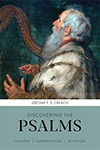
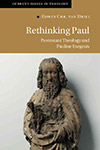 The December 2021 BookTalk featured faculty members the Rev. Drs. Jerome Creach and Edwin van Driel, who have recently published books that cross disciplinary lines within the theological fields. Their work offers us the opportunity to have a robust conversation with two well-respected scholars about the fruitful interdisciplinary work that is possible in theology and biblical studies. Watch as Drs. Creach and van Driel talk about their books, Discovering Psalms: Content, Interpretation, Reception and Rethinking Paul: Protestant Theology and Pauline Exegesis, respectively. The LibGuide for this BookTalk may be found at https://guides.pts.edu/facultyseries.
The December 2021 BookTalk featured faculty members the Rev. Drs. Jerome Creach and Edwin van Driel, who have recently published books that cross disciplinary lines within the theological fields. Their work offers us the opportunity to have a robust conversation with two well-respected scholars about the fruitful interdisciplinary work that is possible in theology and biblical studies. Watch as Drs. Creach and van Driel talk about their books, Discovering Psalms: Content, Interpretation, Reception and Rethinking Paul: Protestant Theology and Pauline Exegesis, respectively. The LibGuide for this BookTalk may be found at https://guides.pts.edu/facultyseries.
Beyond the White Fence with Edith Humphrey
Dr. Edith Humphrey, William F. Orr Professor Emerita of New Testament, PTS
Nov. 5, 2021
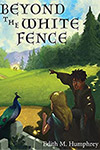 Dr. Edith Humphrey, William F. Orr Professor Emerita of New Testament at Pittsburgh Theological Seminary, discusses her recently published first major work of fiction, the children’s book, Beyond the White Fence. Hear about her creative process, the connections between her children’s novel and the Narnia series of C. S. Lewis, and her plans for her course on Lewis in the Doctor of Ministry program in Creative Writing and Public Theology.
Dr. Edith Humphrey, William F. Orr Professor Emerita of New Testament at Pittsburgh Theological Seminary, discusses her recently published first major work of fiction, the children’s book, Beyond the White Fence. Hear about her creative process, the connections between her children’s novel and the Narnia series of C. S. Lewis, and her plans for her course on Lewis in the Doctor of Ministry program in Creative Writing and Public Theology.
Joe Biden and Catholicism in the United States with Massimo Faggioli
Massimo Faggioli
March 12, 2021
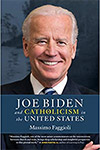 The United States' election in November 2020 was notable in a variety of ways, not the least of which was the election of a Catholic to serve as president—only the second in our nation's history. Joseph R. Biden's presidency has a striking relevance in this moment of our unfolding national story as we question the nature and meaning of the American project. Who are we as a nation? How do we wrestle with the tensions between our societal diversity and our seeking of the common good? What is the proper relationship between church and state? What's our understanding of the presidency itself? And what does it mean to be Catholic in a society that launched with a Protestant vision?
The United States' election in November 2020 was notable in a variety of ways, not the least of which was the election of a Catholic to serve as president—only the second in our nation's history. Joseph R. Biden's presidency has a striking relevance in this moment of our unfolding national story as we question the nature and meaning of the American project. Who are we as a nation? How do we wrestle with the tensions between our societal diversity and our seeking of the common good? What is the proper relationship between church and state? What's our understanding of the presidency itself? And what does it mean to be Catholic in a society that launched with a Protestant vision?
Historian and theologian Massimo Faggioli, whose new book Joe Biden and Catholicism in the United States (Bayard, 2021), addressed these questions through the double lens of Joe Biden's place in United States history and the triangular relationship between the U.S. Catholic Church, Vatican, and presidency.
Faggioli's perspective as an interpreter of American Catholicism is unique due to his roots in Italy and is deeply informed by an intense study of the context of Catholicism within the U.S. His book has been called, "a timely, thoughtful, provocative, and necessary book for our moment" by journalist and commentator E. J. Dionne. And Julian Coman, associate editor of The Guardian notes that it is "a must-read for anyone who truly wants to understand Joe Biden."
Trauma-Informed Yoga: A Toolbox for Therapists with Joanne Spence
Joanne Spence '18/'24, Spiritual Director, Social Worker, and Yoga Teacher
March 26, 2021
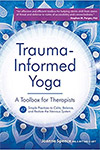 In this time of upheaval and grief, many of us are experiencing emotional, physical, and even spiritual stresses and strains that may surprise us. Some observers have labeled this as a time of trauma for people in American society, noting that many are in looking for ways to heal due to their experiences during the pandemic. Into this space comes the helpful and insightful voice of PTS alumna and Board member Joanne Spence, a spiritual director, social worker, and yoga teacher whose work in addressing trauma and stress through breath and movement has been groundbreaking. Spence's wisdom, conveyed in Trauma-Informed Yoga: A Toolbox for Therapists (PESI, 2021), developed over the last 21 years through her teaching in schools, veteran's groups, churches, hospitals, prisons, the seminary, and even in her own backyard! Along the way, we discuss the ways in which Spence's theological studies at PTS have informed her approaches to both writing and teaching yoga.
In this time of upheaval and grief, many of us are experiencing emotional, physical, and even spiritual stresses and strains that may surprise us. Some observers have labeled this as a time of trauma for people in American society, noting that many are in looking for ways to heal due to their experiences during the pandemic. Into this space comes the helpful and insightful voice of PTS alumna and Board member Joanne Spence, a spiritual director, social worker, and yoga teacher whose work in addressing trauma and stress through breath and movement has been groundbreaking. Spence's wisdom, conveyed in Trauma-Informed Yoga: A Toolbox for Therapists (PESI, 2021), developed over the last 21 years through her teaching in schools, veteran's groups, churches, hospitals, prisons, the seminary, and even in her own backyard! Along the way, we discuss the ways in which Spence's theological studies at PTS have informed her approaches to both writing and teaching yoga.
